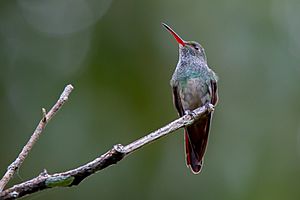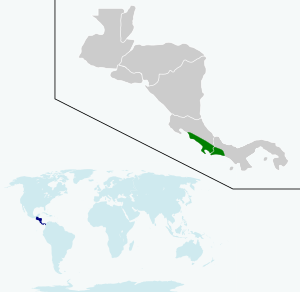Charming hummingbird facts for kids
The charming hummingbird (Polyerata decora) is a tiny, colorful bird. It is also known as the beryl-crowned hummingbird. This amazing bird is a type of hummingbird and belongs to the family Trochilidae. You can find charming hummingbirds living in the warm countries of Costa Rica and Panama.
Quick facts for kids Charming hummingbird |
|
|---|---|
 |
|
| Conservation status | |
| Scientific classification | |
| Genus: |
Polyerata
|
| Species: |
decora
|
 |
|
Contents
About the Charming Hummingbird
Charming hummingbirds are known for their beautiful colors. They are small, fast, and very active birds. These hummingbirds play an important role in their habitat. They help pollinate flowers as they search for food.
Where It Lives and What It Eats
The charming hummingbird lives in subtropical or tropical moist lowland forests. It also lives in areas that were once forests but have changed a lot. These birds prefer to stay on the edges of forests. Here, they look for scattered flowers to drink nectar from. They also hunt for small arthropods, like insects, to eat.
Why It's Special
The charming hummingbird looks a lot like the blue-chested hummingbird. However, scientists have found some key differences. The charming hummingbird has a longer beak and longer wings. It also has slightly different colors. Because of these unique features, it is now considered its own separate species.
How They Find Mates
Male charming hummingbirds have a special way to attract females. They gather in groups called leks. Up to 12 male birds will sing together in these leks. They hope their songs and displays will attract a mate. This is a common way for some bird species to find partners.
Its Scientific Name Change
For a long time, the charming hummingbird was placed in a group called Amazilia. But scientists are always learning new things about animals. In 2014, a study looked closely at the genes of hummingbirds. This study found that the Amazilia group was not as clear-cut as once thought.
Because of this new information, scientists decided to reorganize some hummingbird groups. The charming hummingbird was then moved to a different group. This group is called Polyerata. This change helps scientists better understand how different hummingbird species are related to each other.
See also
- In Spanish: Amazilia decora para niños



